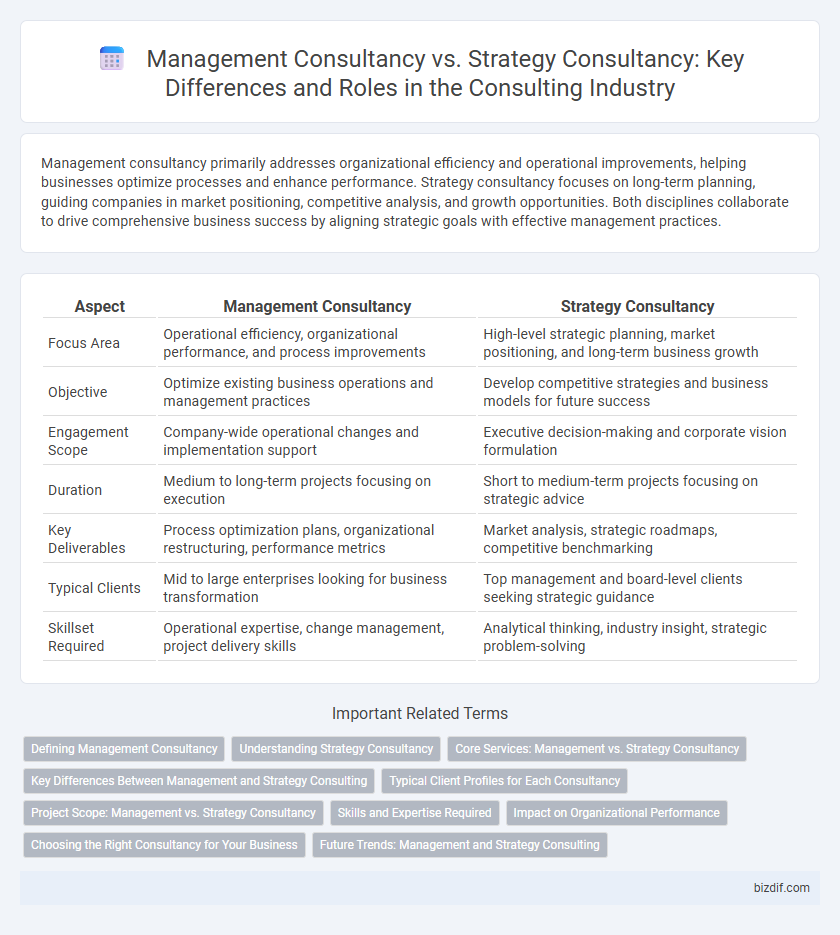Management consultancy primarily addresses organizational efficiency and operational improvements, helping businesses optimize processes and enhance performance. Strategy consultancy focuses on long-term planning, guiding companies in market positioning, competitive analysis, and growth opportunities. Both disciplines collaborate to drive comprehensive business success by aligning strategic goals with effective management practices.
Table of Comparison
| Aspect | Management Consultancy | Strategy Consultancy |
|---|---|---|
| Focus Area | Operational efficiency, organizational performance, and process improvements | High-level strategic planning, market positioning, and long-term business growth |
| Objective | Optimize existing business operations and management practices | Develop competitive strategies and business models for future success |
| Engagement Scope | Company-wide operational changes and implementation support | Executive decision-making and corporate vision formulation |
| Duration | Medium to long-term projects focusing on execution | Short to medium-term projects focusing on strategic advice |
| Key Deliverables | Process optimization plans, organizational restructuring, performance metrics | Market analysis, strategic roadmaps, competitive benchmarking |
| Typical Clients | Mid to large enterprises looking for business transformation | Top management and board-level clients seeking strategic guidance |
| Skillset Required | Operational expertise, change management, project delivery skills | Analytical thinking, industry insight, strategic problem-solving |
Defining Management Consultancy
Management consultancy focuses on improving an organization's overall performance by analyzing existing business problems and developing plans for improvement across operations, human resources, and corporate governance. Unlike strategy consultancy, which zeroes in on long-term business goals and market positioning, management consultancy addresses day-to-day management issues and process enhancements. Key services include organizational change management, operational efficiency, and performance measurement systems tailored to client needs.
Understanding Strategy Consultancy
Strategy consultancy specializes in defining long-term organizational goals, competitive positioning, and market entry tactics to drive sustainable growth. Unlike management consultancy, which addresses operational efficiency and organizational structure, strategy consultants provide data-driven insights and frameworks to guide C-suite decision-making and business transformations. Key deliverables include growth strategies, portfolio analysis, and scenario planning informed by industry trends and competitive intelligence.
Core Services: Management vs. Strategy Consultancy
Management consultancy primarily focuses on optimizing organizational processes, improving operational efficiency, and driving change management across various departments. Strategy consultancy centers on long-term business planning, competitive positioning, market entry strategies, and corporate growth initiatives. While management consultancy enhances internal operations, strategy consultancy shapes the company's future direction and overall business model.
Key Differences Between Management and Strategy Consulting
Management consulting focuses on improving overall organizational performance through process optimization, operational efficiency, and change management, while strategy consulting centers on high-level business decisions such as market entry, competitive positioning, and long-term growth planning. Key differences include the scope of work, with management consultants addressing day-to-day operations and internal challenges, whereas strategy consultants develop frameworks for corporate strategy and innovation. Strategy consulting typically involves C-suite collaboration on future-oriented initiatives, whereas management consulting often supports mid-level management in executing strategic plans.
Typical Client Profiles for Each Consultancy
Management consultancy typically serves mid-sized to large enterprises seeking operational improvements, organizational restructuring, and performance optimization. Strategy consultancy targets C-suite executives and Board members of multinational corporations aiming for long-term growth, market entry, and competitive positioning. Both consultancies attract clients across diverse industries, but strategy consultancies focus more on high-level decision-makers driving transformative initiatives.
Project Scope: Management vs. Strategy Consultancy
Management consultancy typically addresses a broader project scope, focusing on improving overall organizational performance, operational efficiency, and change management initiatives. Strategy consultancy, by contrast, concentrates on defining long-term corporate goals, competitive positioning, and market entry strategies within a narrower project scope. Both types leverage data-driven analysis but differ fundamentally in their approach to project objectives and deliverables.
Skills and Expertise Required
Management consultancy demands strong organizational, operational, and change management skills to improve business performance across functions, while strategy consultancy requires advanced analytical abilities, market research expertise, and high-level problem-solving skills to develop long-term growth plans. Management consultants often possess skills in process optimization, project management, and stakeholder communication, whereas strategy consultants excel in financial modeling, competitive analysis, and strategic decision-making frameworks. Both fields require critical thinking, data interpretation, and excellent client engagement capabilities, but the depth and focus of expertise vary according to the consultancy type.
Impact on Organizational Performance
Management consultancy improves organizational performance by streamlining operations, enhancing leadership effectiveness, and optimizing resource allocation across various functions. Strategy consultancy drives long-term growth by identifying market opportunities, shaping competitive advantage, and aligning corporate vision with actionable strategic plans. Both specialties contribute to performance, with management consultancy focusing on execution efficiency and strategy consultancy on directional clarity and sustainable development.
Choosing the Right Consultancy for Your Business
Management consultancy focuses on improving overall organizational performance through operational efficiency, change management, and process optimization, while strategy consultancy centers on long-term business planning, market positioning, and competitive analysis. Selecting the right consultancy depends on your business needs: choose management consultants to enhance internal workflows and reduce costs, and opt for strategy consultants for growth initiatives, market expansion, or corporate restructuring. Accurate assessment of your company's immediate challenges and future goals ensures the consultancy delivers targeted expertise and measurable impact.
Future Trends: Management and Strategy Consulting
Management consultancy increasingly integrates digital transformation, data analytics, and operational efficiency to drive organizational growth, while strategy consultancy emphasizes long-term competitive positioning through market analysis, innovation, and business model redesign. Future trends highlight the convergence of these fields, with consultants leveraging AI and machine learning to provide predictive insights that shape strategic decisions and optimize management processes. The rise of agile methodologies and sustainability-focused strategies further differentiates consulting approaches, addressing evolving client demands in dynamic business environments.
Management consultancy vs Strategy consultancy Infographic

 bizdif.com
bizdif.com